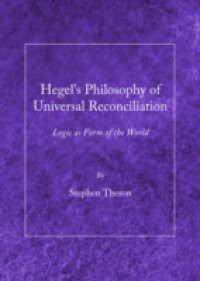This book is the final one in a series of four on Hegel as theologian, first presented as such in New Hegelian Essays (Cambridge Scholars Publishing, 2012). In From Narrative to Necessity (2012) we then set forth the essential theme of Hegel's theology as the transcendence of "picture-thinking". In a third volume, Reason's Developing Self-Revelation (2013), we specified this same theme as humanity's accomplished future (ultimate end of life, the Idea). Here, finally, we discover the reconciliation of Mind with itself as the nerve of Hegel's thought. Hence, this book is subtitled "Logic as Form of the World", picking up on Gottlob Frege's rhetorical question, "What is the world without the reason?"The first chapter recapitulates that intimate union of God and man the Christian confessional movement would manifest, set forth here philosophically. This leads naturally to an identification of faith, the virtue, with the habit of rationality. Religious apologetic is found to fall short of philosophy, which forms a system (chapter 15). In "Logic and the World" (chapter18) we further specify such logical knowledge as issuing in rational will, called love in J. M. E. McTaggart's Hegelian writings.Man himself, herself, is finally identified with Mind as both the uniquely determining "form" (the Idea) of our self-transcending nature, universalising the individual, individualising the universal, and, equally, form of "the world". Here the thrust of Hegel's metaphysics confirms those of Aristotle on this point. Last, after some historical and practical reflections (medieval thought, the clergy, Marxism), we end where we began, with the transforming effect of Hegel's thought as developing the doctrine of a divine creation in particular, while also developing the doctrine of this development itself, in anticipatory development, therefore, of J. H. Newman's classic essay of 1845 on The Development of Christian Doctrine.

